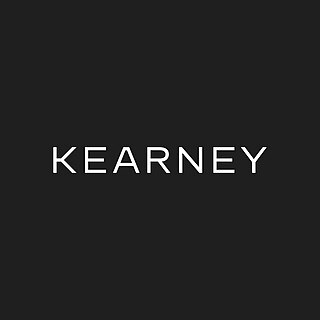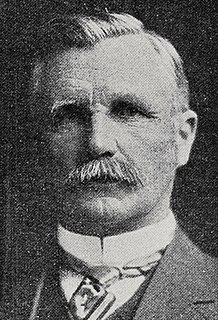
Wool is the textile fibre obtained from sheep and other animals, including cashmere and mohair from goats, qiviut from muskoxen, hide and fur clothing from bison, angora from rabbits, and other types of wool from camelids.
McKinsey & Company is a management consulting firm, founded in 1926 by University of Chicago professor James O. McKinsey, that advises on strategic management to corporations, governments, and other organizations. McKinsey is the oldest and largest of the "Big Three" management consultancies (MBB), the world's three largest strategy consulting firms by revenue. It has consistently been recognized by Vault as the most prestigious consulting firm in the world.
Mulesing is the removal of strips of wool-bearing skin from around the breech (buttocks) of a sheep to prevent the parasitic infection flystrike (myiasis). The wool around the buttocks can retain faeces and urine, which attracts flies. The scar tissue that grows over the wound does not grow wool, so is less likely to attract the flies that cause flystrike. Mulesing is a common practice in Australia for this purpose, particularly on highly wrinkled Merino sheep. Mulesing is considered by some to be a skilled surgical task. Mulesing can only affect flystrike on the area cut out and has no effect on flystrike on any other part of the animal's body.

Sheep shearing is the process by which the woollen fleece of a sheep is cut off. The person who removes the sheep's wool is called a shearer. Typically each adult sheep is shorn once each year. The annual shearing most often occurs in a shearing shed, a facility especially designed to process often hundreds and sometimes more than 3,000 sheep per day.

Kearney is an American management consulting firm founded in 1926 as a branch of McKinsey & Company. The company became independent in 1939, and currently has offices in more than 40 countries worldwide. Kearney has consistently earned top places among global management consulting firm rankings, such as Vault's Consulting 50 and Consulting magazine's "Best Firms to Work For."

Rajat Kumar Gupta is an Indian-American businessman and convicted felon who, as CEO, was the first foreign-born managing director of management consultancy firm McKinsey & Company from 1994 to 2003. In 2012, he was convicted for insider trading and spent two years in jail. Gupta was a board member of corporations including Goldman Sachs, Procter & Gamble and American Airlines, and an advisor to non-profits such as the Bill & Melinda Gates Foundation and The Global Fund to Fight AIDS, Tuberculosis and Malaria. He is the co-founder of the Indian School of Business, American India Foundation, New Silk Route and Scandent Solutions.
Sir Ian Edward Lamert Davis is an English businessman, best known for his role as managing director of McKinsey & Company. He succeeded Rajat Gupta on 1 July 2003. He joined McKinsey in 1979 retired in 2010, after 7 years at Bowater and currently serves as a senior partner emeritus.

New Zealand wine is produced in several of its distinct winegrowing regions. As an island country in the South Pacific Ocean, New Zealand has a largely maritime climate, although its elongated geography produces considerable regional variation from north to south. Like many other New World wines, New Zealand wine is usually produced and labelled as single varietal wines, or if blended, winemakers list the varietal components on the label. New Zealand is best known for its Marlborough Sauvignon Blanc, and more recently its dense, concentrated Pinot Noir from Marlborough, Martinborough and Central Otago.
New Zealand Winegrowers is the national industry body that represents New Zealand's viticulture and winemaking sectors. It conducts research, promotion, marketing and advocacy in the interests of New Zealand grape growers and winemakers, both domestically and in international export markets. Winemakers and grape growers are automatically entitled to membership of New Zealand Winegrowers through payment of the levies on grape or wine sales required by law in the Commodity Levies Act 1991 and the Wine Act 2003. This combined with New Zealand's small size means that it is the only country in the world with a single national wine industry body.
Oliver Wyman is an American management consulting firm. Founded in New York City in 1984 by former Booz Allen Hamilton partners Alex Oliver and Bill Wyman, the firm has more than 60 offices in Europe, North America, the Middle East, and Asia-Pacific, employing over 5,000 professionals. The firm is part of the Oliver Wyman Group, a business unit of Marsh McLennan.
Icebreaker is a merino wool outdoor and natural performance outdoor clothing brand headquartered in Auckland, New Zealand. It was purchased by VF Corporation, a NYSE listed entity in 2018. Icebreaker was conceived and designed around the philosophy of sustainability, using natural fibres, environmental and social ethics, and animal welfare. The company began by specialising in the creation of merino base layers and now offers underwear, mid layers, outer wear, socks and accessories based on natural fibers.
Mark Rhys Weldon is a New Zealand businessman and swimmer.

Richard Phineas Hudson was a Reform Party Member of Parliament in New Zealand. Born in Ireland, he was a tea planter in British Ceylon before becoming a fruit grower in New Zealand.

Sir Hugh John Dyke Acland, generally known as Jack Acland, was a New Zealand politician of the National Party.

Kiwifruit or kiwi is a major horticultural export earner for New Zealand. New Zealand developed the first commercially viable kiwifruit and developed export markets, creating the demand for the fruit that exists today. Today New Zealand is the third largest kiwifruit producing country, next to China and Italy, and holds approximately 30% of the market share. In the 2008–2009 season the value of New Zealand kiwifruit exports was NZ$1.45 billion.

Dominic Barton, known as Bao Damin in China, is a Ugandan-born Canadian business executive, author, management consultant, and diplomat. He currently serves as the Canadian Ambassador to the People's Republic of China. Prior to this, Barton was the Managing Director of McKinsey & Company, the global consulting firm, from 2009 to 2018. He has held his current position as Ambassador since September 5, 2019. He is also the incumbent chancellor at the University of Waterloo and has previously served as Chairman of Teck Resources and as Non-Executive Director at the Singtel Group in Singapore and Investor AB in Sweden.

The International Wool Secretariat (IWS) was formed in 1937 to promote the sale of wool on behalf of woolgrowers and review research carried out by independent bodies such as the Wool Industries' Research Association at Torridon, Headingley Lane, Leeds, England.
The Australian Wool Board was an Australian Government statutory board that existed in its first phase between May 1936 and January 1945; in its second phase between June 1945 and June 1953; and in its third and final phase, between May 1963 and December 1972. The first Wool Board, in 1936, together with the Wool Boards of New Zealand and South Africa decided to form an organisation to promote wool, to meet the growing challenge from synthetic fibres, which led to the formation in 1937 of the International Wool Secretariat. There have been other reorganisations of the management of the wool sector in Australia since.
Anjali Bansal is the founder of Avaana Capital, investing in technology and innovation-led start-ups focused on sustainable living to create transformational returns and impact at scale

The Miss Wool of America Pageant was a showcase of wool-related merchandise. It was an annual event organized by the National Wool Growers Association (U.S.), American Sheep Producers Council, and the Wool Bureau, Inc. at San Angelo, Texas, from 1952 to 1972. Originally a Texas-only event, it attracted wider entrants from 1958 and evolved into a national pageant. The winner would tour nationally wearing the latest in woolen fashion to promote the industry.










